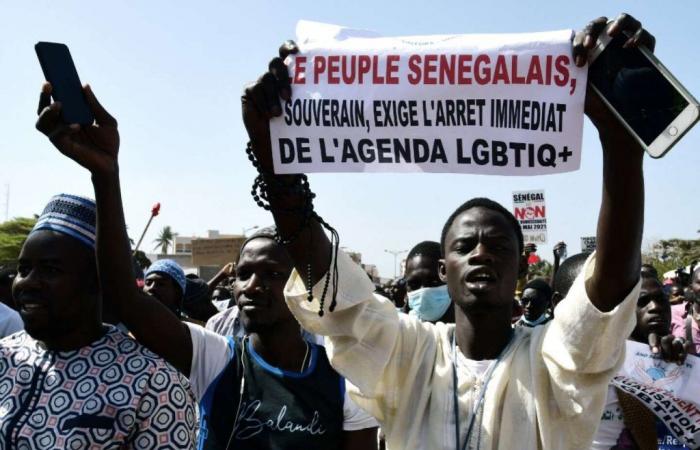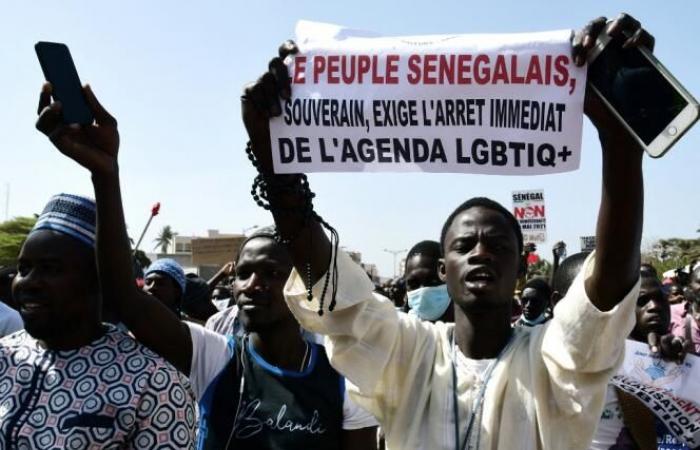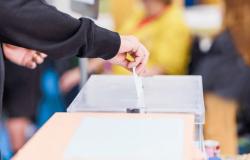The question of the criminalization of homosexuality arises again within the walls of the Senegalese National Assembly. Monday June 24, a member of parliament tabled a bill aimed at toughening the legislation in force. In theory, the initiative benefits from the support of a large part of public opinion, the Hemicycle and the executive since Prime Minister Ousmane Sonko, had promised in 2022 when he was an opponent that he would It would be one of the first laws he would pass if he took office. However, in practice, the adoption of this proposal by Parliament proves delicate as it could destabilize certain diplomatic relations of Senegal.
Read also: In Senegal, the exhumation of the body of a man believed to be homosexual causes controversy
Add to your selections
Until now, article 319.3 of the Penal Code provides for imprisonment of one to five years and a fine of 100,000 to 1,500,000 CFA francs (150 euros to 2,200 euros) for any person who has committed “unnatural act with an individual of one’s own sex.” But MP Cheikh Abdou Bara Dolly Mbacké, from the parliamentary group Liberty, Democracy and Change, who is putting forward the bill, wants to go further. “We must fight against the perversion of the morals of our society, against these immoral cultural values imported from the West”says the elected official who joined the Diomaye President coalition before the presidential victory in March of Bassirou Diomaye Faye.
The text therefore provides for a sentence of ten to fifteen years in prison and a fine of 1 to 5 million CFA francs and would establish “crimes of bisexuality, transsexuality, necrophilia and zoophilia”. In one month, this is the second proposal tabled in the National Assembly aimed at toughening legislation on homosexuality.
“External injunctions”
In addition, the text of the deputy Cheikh Abdou Bara Dolly Mbacké takes up in almost its entirety the provisions of a previous proposal, which dates from 2022. Submitted to the vote of the deputies, it had been rejected by the then presidential majority, which believed that the legislation was already “clear and clear” on the subject, and that there was no need “ to add or remove a comma.
In an unchanged National Assembly, Cheikh Abdou Bara Dolly Mbacké however thinks that his text can pass today. “ In 2022, this law was not passed because the regime of President Macky Sall blocked it in the face of pressure from the Westhe assures. Today it’s different, we have a Prime Minister who, I believe, will not give in to external injunctions. »
Read also | In Senegal, Olympic athletes are struggling: “I thought that being qualified for the Olympics would change my life a little, it’s almost worse”
Add to your selections
In mid-May, during a conference in Dakar with Jean-Luc Mélenchon, devoted to relations between Africa and Europe, Prime Minister Ousmane Sonko warned Westerners that their activism in favor of homosexuals and sexual minorities could cause a « nouveau casus belli » with his country. The opportunity also for him to denounce the fact that “the gender issue comes up regularly in the programs of the majority of international institutions and in bilateral reports, even often as a conditionality for different financial partnerships”.
However, this bill embarrasses the new executive. “Sooner or later we will move towards this type of legislationindicates an advisor to the Prime Minister. Today may not be the right timing. » Same story with the deputies of the African Patriots of Senegal for Work, Ethics and Fraternity (Pastef), the presidential party, and the Yewwi Askan Wi coalition.
” Determined “
The new proposal, if it is able to satisfy a conservative electorate, could however have international consequences and disrupt the diplomatic relations that Dakar maintains with Western chancelleries, or even deprive it of certain institutional funding. For example, the World Bank twice suspended its payments to Uganda, after the adoption of texts criminalizing homosexuality. The same threat hangs over Ghana today, which tightened its law in February.
Read also | LGBT+ people face “alarming increase” in restrictions on freedom of expression and association
Add to your selections
“The executive is caught between its promises and the reality of exercising power,” comments Xalima, an activist for LGBT rights, exiled in France. If the adoption of this law seems uncertain, the concerns of the LGBT community in Senegal are very real. “The country has become unlivable, to the point that every day we see people from the community leaving for neighboring states,” relate Xalima.
Follow us on WhatsApp
Stay informed
Receive the essential African news on WhatsApp with the “Monde Afrique” channel
Join
With the annual parliamentary session due to end on Sunday, it appears ” unlikely ” that the vote takes place before then, according to the president of the law commission, Moussa Diakhate. “We will resume parliamentary work the first half of October,” he announces. Unless an extraordinary session is convened during the summer period.







